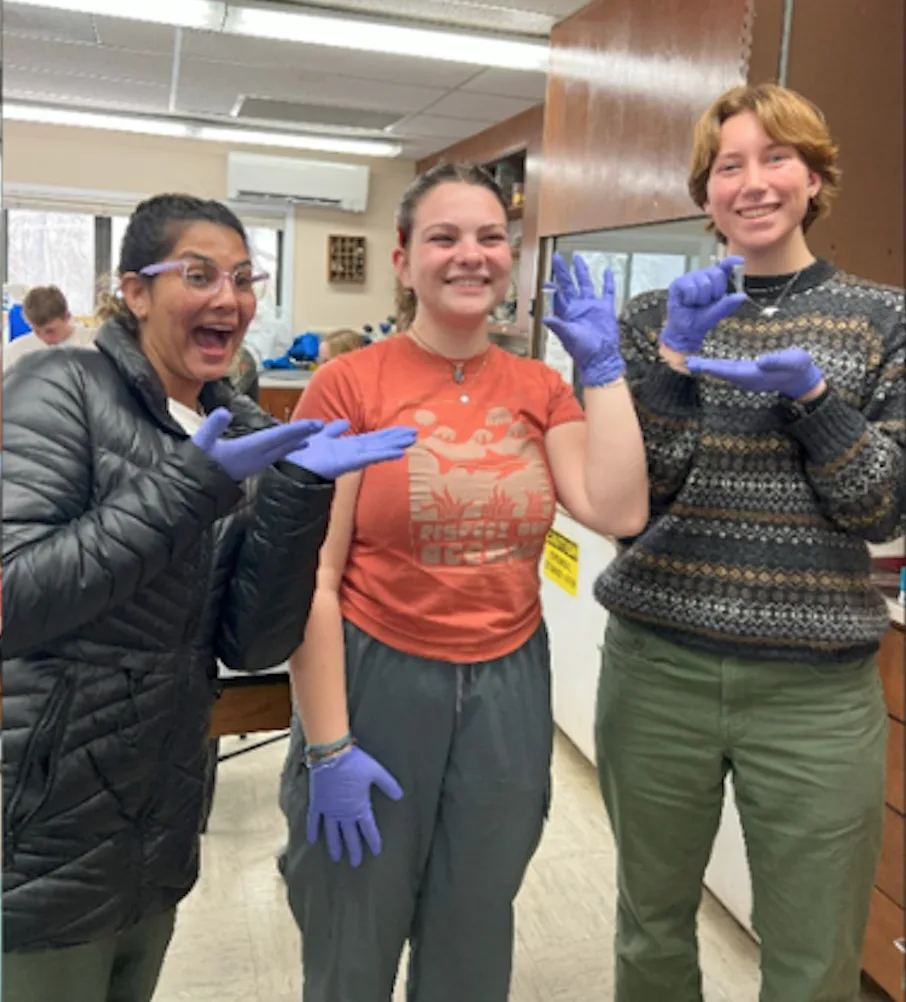Programs Blog
Putting the Community in Scientific Community

Date: March 12, 2025
Time: 2237
Location: SEA Campus, Woods Hole, MA, USA
Weather: Cloudy, 36° F, wind from the Northeast
Hi everyone! My name is Reshmi Mukherjee and I am a junior at Claremont Mckenna College studying Environment, Economics and Politics. Our classes here at SEA have started to gain speed as we approach the middle of our first shore component. Even so, the prank war continues as members of both cottages good naturedly scheme to outdo each other. As assignments get more demanding, it’s been amazing to see our class pull together and begin to learn from each other.
This weekend many of us biked into Woods Hole to explore and get some work done. We promptly discovered that the only coffee shop with room for us closed at 1:00 pm. But still – it was an adventure! Despite its lack of in-town work spots on Sundays, the atmosphere of Woods Hole has been truly one of a kind. Home to many scientific institutions including Woods Hole Oceanographic Institute (WHOI), Marine Biological Laboratory (MBL), and more, the Woods Hole scientific community has been nothing but welcoming to our class. Every scientist we have met on our field trips has offered advice and their email for continued communication. Personally, I was also given the opportunity to interview the first author of the paper I am reading for Environmental Communication class. Despite being two days away from a major move, he not only agreed to speak with me but also to come into town and grab a coffee. The main reason this community is so special to me is the joint passion for science and discovery between students and mentors alike.
This morning was our second lab session for Oceanography class. Today’s focus was on extracting DNA from specimen samples collected by a class from a previous semester. While undergraduate lab classes are sometimes plagued by a desperation to finish, this one couldn’t be more different. Surrounded by classmates interested in the work and excited to learn, I found the lab more enjoyable than ever. Most exciting though, was learning about how we would use this procedure on the boat.
We learned that our days will be an 18-hour cycle. We will work for 6 hours followed by a 12-hour break. Roughly half of our shifts will be spent in the lab. Although the ship’s lab procedures will look like what we practice on shore, I am told that it will be quite different. It turns out that keeping a steady hand while pipetting will be harder without solid ground. The Robert C Seamans has the capability to measure seawater chemistry, the physical environment and the biodiversity of the specimens we will catch in our nets. The coolest in my opinion is the Oxford Nanopore Technology DNA sequencers available to us. These are new generation DNA sequencing technology, the same type as used aboard the International Space Station. For this reason and more, I look forward to our adventures at sea. I can’t wait for what comes next!
Shoutouts:
To my family—my parents, grandparents, aunts and uncles: Thank you for your support and your belief in me. Thank you for your excitement for my adventures which sometimes eclipse even my own. I love and miss you guys and can’t wait to catch you up this summer.
To my CMC gang: Thank you for keeping me connected and involved even when I’m away. I miss you and can’t wait to see you again!
To Stef, Fran, Maya and Trin: Your support means everything to me. I am keeping a journal of my adventures this time and I expect to trade stories when our paths finally overlap.
Finally, to my research advisor Branwen Williams: Thank you for sharing your love for the ocean and for science. Your career inspires me every day.

Recent Posts from the Ships
- Ocean Classroom 2024-A collaborative high school program with Proctor Academy
- Collaborations and Long-term Commitments: SEA’s Caribbean Reef Program Sets a Course for Coastal Programs that Compliment Shipboard Experiences.
- Sea Education Association students prepare for life underway using state of the art nautical simulation from Wartsila Corporation.
- SEA Writer 2022, Magazines From the Summer SEA Quest Students
- Technology@SEA: Upgrades Allow Insight into Ocean Depths
Programs
- Gap Year
- Ocean Exploration
- High School
- Science at SEA
- SEA Expedition
- SEAScape
- Pre-College
- Proctor Ocean Classroom
- Protecting the Phoenix Islands
- SPICE
- Stanford@SEA
- Undergraduate
- Climate and Society
- Climate Change and Coastal Resilience
- Coral Reef Conservation
- Marine Biodiversity and Conservation
- MBL
- Ocean Exploration: Plastics
- Ocean Policy: Marine Protected Areas
- Oceans and Climate
- Pacific Reef Expedition
- The Global Ocean: Hawai'i
- The Global Ocean: New Zealand